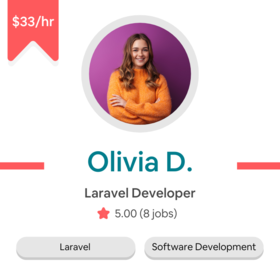













Node.js continues to be the dominating web technology. You’ll certainly need to tap into its features and functionalities to keep up with the web and app development trends for years to come. Cad Crowd is here to bring the most talented Node.js developers to your door.
Let's make one thing clear first: Node.js is not a programming language. Contrary to popular belief, it's not even a web development framework in the same way that Angular, Svelte, Django, Laravel, or ASP.NET is. Node.js is a JavaScript runtime environment designed primarily to facilitate the server-side of websites and applications. It's an open-source technology and can run on various computer operating systems, including but not limited to Microsoft Windows, macOS, Linux, IBM AIX, FreeBSD, OpenBSD, and z/OS. The runtime also supports ARM processors such as BeagleBone Black and Raspberry Pi.
While it's mostly used for back-end development, Node actually offers packages and modules specifically for front-end, too. As far as front-end development is concerned, however, any professional developer wouldn't likely pick it over the more robust alternatives like React, Semantic UI, or Bootstrap. The lack of front-end features is not exactly a drawback; in fact, it's intentional so that the runtime environment can focus more on the core libraries. For example, it comes with no native support for object-oriented programming to keep the codebase efficient and small, allowing for fast and responsive back-end design. The good thing is that developers can use external libraries, such as React, to deal with the limitations.
Because Node.js is primarily a server-side technology, Node.js developers work mostly on the back-end development of web/apps. They may, sometimes, provide technical support for front-end developers, but that’s not part of the main roles. First and foremost, Node.js developers are responsible for the deployment and maintenance of applications. Keep in mind that an application might be composed of multiple online services integrated into a single platform. Their general roles and responsibilities don't stray far from the typical job description of a web/app developer, for example:
Many online applications are deployed from cloud platforms, so every Node.js developer has to be familiar with Azure and Amazon Web Services (AWS). Proper integration with cloud platforms requires infrastructure configuration.
Node.js is one of the most versatile JavaScript runtime environments. In the hands of a competent developer, it offers just about everything necessary to handle server-side development of various digital platforms, including but not limited to:
| Types of software | Level of complexity | Users |
|
|
|
Node.js allows developers to divide program components into separate functionalities or services, essentially creating microservices in the process. Such versatility makes it easier to upscale the app or add more features as soon as they become available. Some of the other main advantages include:
Thanks to its wealth of features and overall scalability, Node.js is used by some of the world's most well-known companies, such as Mozilla, PayPal, Netflix, eBay, Medium, Walmart, LinkedIn, and Uber, to name a few. It's an all-around dependable runtime environment that accommodates quick and scalable web/app development projects. The fact that it's an open-source technology guarantees long-term usability and worldwide support from a large community of developers worldwide as well.
The ideal option is, of course, to have an in-house team of Node.js developers to handle all your web/app development and maintenance work. Since they work full-time for your company, they can be integral parts of the product design and marketing teams. However, this can be quite a financial burden for a small company.
If budget is a concern, the first option you might want to consider is most likely the freelance route. Working with freelancers has been proven an effective method to fulfill a small-scale yet immediate hiring necessity. Chances are you can always find freelancers ready to take on a new project, and many of them are just as skillful as any active candidate applying for full-time jobs. That said, you must remember that not every freelancer shares the same level of experience, so tread carefully and take a detailed look at their previous projects before you make the decision.
Hiring freelance programmers and developers often comes with a more affordable rate, too. While they're technically on your payroll, they handle their own taxes, and you don't have to offer other benefits typically necessary for full-time employees.
Another option is to outsource the entire project to a team of qualified Node.js developers. Outsourcing web or app development is a popular model for small and medium-sized companies whose core business operations don't revolve around too much on the technicality of web/app development itself. For example, if your business is all about selling physical items, you might not need constant complex maintenance work on your web store user interface; companies that primarily sell services like architectural firms, image/video editing, graphics design, or home maintenance services probably need minimum web/app upkeep as well.
Outsourcing allows a company to hire an entire highly specialized team for a specific project only. If the company needs to add more features to the web/app, upgrade its capabilities, or do basically any work that doesn't involve a major overhaul, hiring a qualified freelancer or two should be enough to get the job done. Yes, you need to do more frequent hiring over time, but it still should be more cost-efficient than keeping a full-time team of Node.js developers on the payroll.
Let's not forget that you can have either the freelance or the outsource option as a remote hiring model. Most people associate the term "remote recruitment" with hiring someone based in another country. Although it's not entirely inaccurate, you can also apply the exact same basic process to someone from another state. As long as the freelancers/outsourced developers work off-site (they're not physically present in the building), that's remote work. Say your company is based in San Francisco, California, and it just happens that a competent Node.js developer with a fitting portfolio and the right hourly rate is residing in Boston, Massachusetts. Since full-time hiring is too much of a hassle for the developer due to logistical reasons, you agree to do remote employment.
Regardless of your preferred method of choice, Cad Crowd caters to your needs and delivers just the right range of staffing services to fulfill your hiring requirements. Depending on the type of project (long-term or short-term), job qualifications, and budget, our recruiters can help you develop a proper job description, roles and responsibilities, and typical day-to-day tasks. It all might seem like trivial matters, but a proper description helps attract only the right candidates and keep the unqualified at bay.
Cad Crowd has been working with hundreds of developers specializing in various programming languages, web development frameworks, and runtime environments – including Node.js – for 15 years. We've connected employers, including individual clients and companies from various industries, to talented Node.js developers based in the US, Canada, and beyond. Our massive talent database is filled with qualified professionals with commendable experiences in handling small and large web/app development projects for all sorts of businesses worldwide.
Give Cad Crowd a call today, and we can schedule a detailed discussion about your current staffing needs, what services we offer for your specific purposes, and how we can collaborate to manage the hiring process and achieve optimum results.
Whether starting a new project or enhancing an existing application, the right expertise can make all the difference. Dive into real-time, scalable, and efficient applications with our experienced node.js developers. Don't let your vision remain just a dream; turn it into a tangible, high-performing reality. Get started today, and let us connect you with the best freelance node.js talent from around the globe. Request a free quote to embark on your Node.js journey with Cad Crowd.


